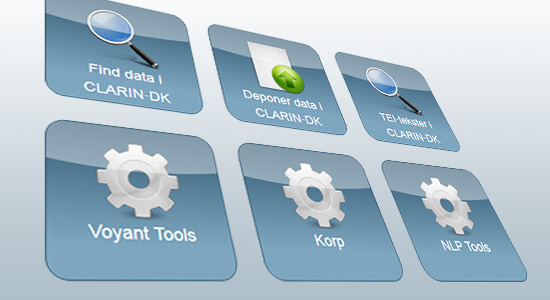DIGHUMLAB
DIGHUMLAB, Digital Humanities Lab Denmark. DIGHUMLAB is a Danish research infrastructure initiative in the humanities area. DIGHUMLAB will enhance and facilitate Digital Humanities in Danish research, thereby contributing to greater interdisciplinary cooperation, widespread knowledge transfer and global orientation and increased internationalisation of both research and education.

Language based materials and tools
Language-based materials and tools is the title of one of three major work packages, called themes.
Centre for Language Technology is responsible for Theme 1 – Language based materials and tools, one of which the Danish CLARIN infrastruktur is part of. Read more about CLARIN-DK.
Under the theme "Language-based materials and tools" the main activities are all of a nature such that they aim at and contribute to:
- enhancing Danish research infrastructure for the humanities by identifying and adding language based materials and tools to the existing Danish CLARIN repository, and by encouraging the creation and development of new materials and tools
- making the research infrastructure known among Danish humanities scientists by offering and contributing to ph.d.-courses, workshops, seminars and training courses for scientists
- fulfilling the Danish contractual obligations and commitments as a founding member of the European Research Infrastructure Consortium, CLARIN.
Language-based materials and tools is the title of one of three major work packages, called themes, within the national Danish Digital Humanities Lab (DigHumLab), which is a common research infrastructure for the humanities in Denmark.
The aim of the work package on language-based materials and tools is to:
1) Conduct a survey of the already available materials and tools at the Danish universities and other research institutions working with language-based materials. The goal of the survey is to identify and select materials according to relevant criteria, such as what is out there, what do the users (the researchers) want, and what types of materials are suited for ph.d. training courses and other courses.
2) Use the results of the survey to select materials, preferably of all types, for the first wave of inclusion into the existing Danish CLARIN platform. Inclusion entails that data must be cleaned, organised, converted, annotated, processed and deposited with suitable licenses and thus be made available to other researchers. This increase in the volume of content shared through the infrastructure is expected to make it attractive to more researchers to use and contribute to the research infrastructure. Co-financing contributions by the owners of the selected materials in terms of time and operational expenses will be necessary.
3) Plan and carry out subsequent waves of inclusion of selected materials.
4) Draw up an agreement with CLARIN ERIC which specifies the details of the Danish CLARIN contribution which has to come from DIGHUMLAB in general, and the language-based materials more specifically.
5) Work for the establishment of a Danish data center, with the aim of making it qualify for a type B center rating in relation to CLARIN ERIC. This is one of the terms Denmark has agreed to by signing up as a founding member of this European wide research infrastructure.
6) Continue the development of the technical Danish CLARIN infrastructure platform and enable it to accommodate more types of materials and tools and to make it able to present the materials and the processes carried out on them by the tools in the ways needed by the research communities. This could for example be through visualization.
7) Collaborate with the current partners in the DIGHUMLAB project about them storing their data, if they so wish, in the CLARIN repository, and also to collaborate and seek to include more partners e.g. libraries and other research institutions belonging to the Ministry of Culture.
8) Contribute to communicating knowledge about the infrastructure to a wider public.
9) Work to ensure the long term continuation of the research infrastructure after 2016.
University of Aarhus (project leader)
University of Copenhagen (Centre for Language Technology, Department of Nordic Research)
University of Southern Denmark,
Aalborg University
The Royal Library
The State Library.
Researchers
| Name | Title | Phone | |
|---|---|---|---|
| Bart Jongejan | IT Officer, FU | +4535329075 | |
| Costanza Navarretta | Senior Researcher | +4535329079 | |
| Simon Gray | Special Consultant | +4535337688 | |
| Sussi Olsen | Academic Research Staff | +4535329064 |
Contact
Costanza Navarretta
National CLARIN coordinator
Senior Researcher
Department of Nordic Studies and Linguistics
University of Copenhagen
